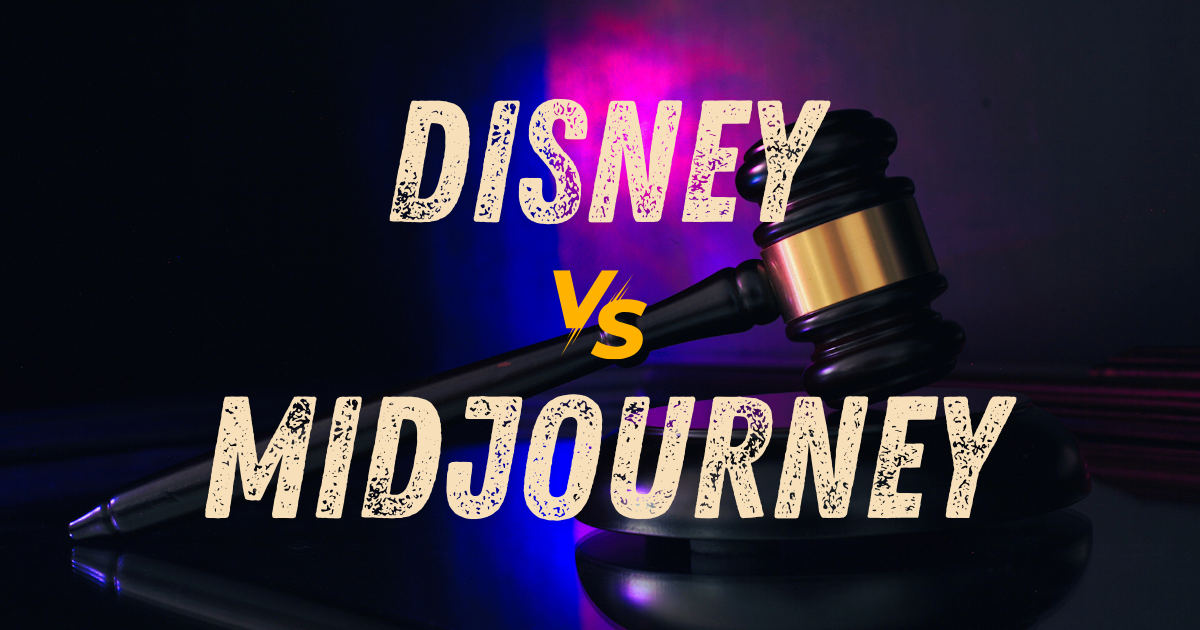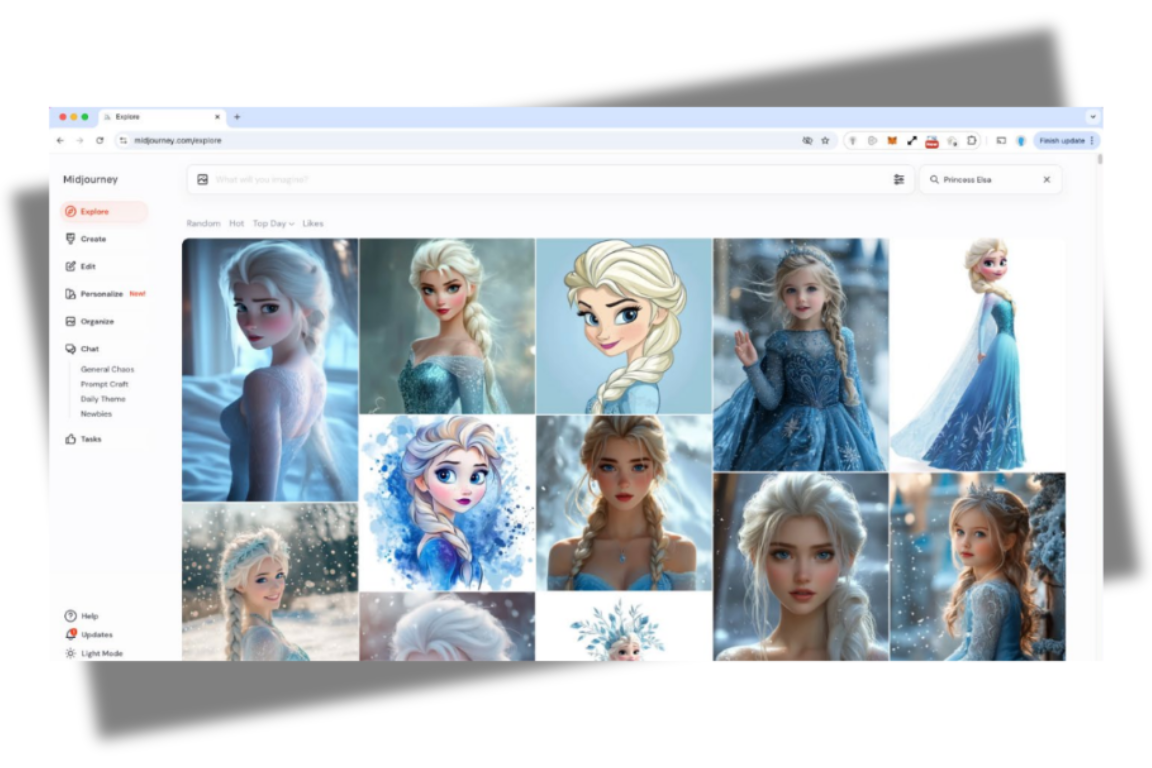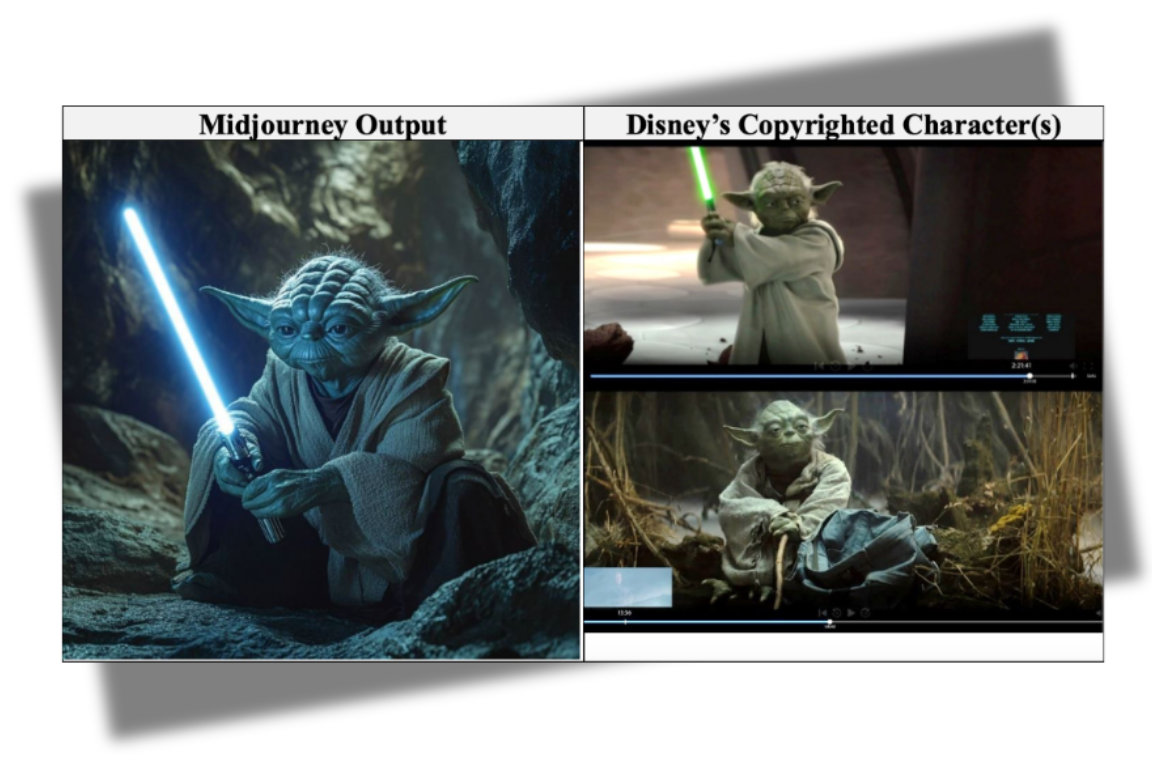Disney vs Midjourney: What This Landmark AI Lawsuit Means for Authors and Publishers

In June 2025, a legal battle erupted between some of the biggest names in entertainment—Disney, Marvel, Lucasfilm, Universal Pictures, and DreamWorks—and one of the most popular AI startups in the world, Midjourney. This IP copyright lawsuit has quickly become a defining case in the growing friction between AI innovation and copyright protection.
While the media has focused on characters like Darth Vader and the Minions being replicated by AI, this lawsuit holds much more profound meaning, especially for authors, publishers, and independent content creators. If you write, publish, license, or monetize creative work in the digital age, you need to understand what’s happening in this case and why it could reshape your business.
What’s the Disney v. Midjourney Case About?
On June 11, 2025, Disney and Universal filed a lawsuit in the U.S. District Court for the Central District of California, accusing Midjourney of direct and secondary copyright infringement. The plaintiffs claim that Midjourney’s AI image generator was trained on and continues to reproduce unauthorized versions of copyrighted characters and artworks owned by the studios. The claim is well-documented, spanning over 100 pages, and contains various prompts and their outputs from Midjourney, compared to trademarked characters.

From prompts like “Yoda with lightsaber” to “Princess Elsa” users have been able to generate high-quality images that closely resemble protected characters. Disney and Universal argue that Midjourney:
- Used copyrighted content to train its AI without permission
- Enables users to create derivative works featuring protected IP
- Markets and profits from these outputs
- Ignores takedown requests and refuses to implement IP filters

This is not just about still images. Midjourney is reportedly developing a video-generation model that may also infringe on protected IP. The lawsuit states that Midjourney made $300 million in 2024 by selling AI tools that allegedly exploit the creativity of others.
Why Authors and Publishers Should Pay Attention
At first glance, a fight between Hollywood and an image generator may not seem directly relevant to authors and book publishers. But the legal and ethical implications of this AI lawsuit reach far beyond screenplays and cartoons.
Here’s why this case matters to our industry:
1. Textual IP Could Be Next
If an AI model can generate Darth Vader images, it can just as easily produce stories, scripts, or books “in the style of” J.K. Rowling, Stephen King, or you. Just as image generators scrape visual media, text-based models have been trained on books, articles, and author websites, often without the authors' permission.
A victory for Disney could encourage more lawsuits—this time from authors and publishers whose texts were used to train LLMs like ChatGPT, Claude, and others. Several class actions are already underway.
2. It Could Shape Licensing Frameworks
If courts rule that training on or reproducing copyrighted works without consent is illegal, AI developers may need to obtain licenses for training data, including books and other written content. This would create a potential new income stream for authors and publishers willing to license their IP for ethical AI development.
Imagine platforms paying authors for access to clean datasets. This could be the Spotify moment for AI-generated content.
3. Market Confusion & Brand Dilution
When an AI can produce thousands of derivative works that closely mimic well-known characters, voices, or writing styles, it creates noise and confusion in the market. For authors, this poses risks:
- Fan fiction flooding retail platforms
- Unauthorized audiobooks or scripts generated “in your voice”
- AI-made covers or titles competing with your real ones
If you’ve worked hard to build a brand, this kind of mimicry can undermine your credibility and dilute your reach.
What the Industry is Saying
Reactions to the Disney v. Midjourney AI lawsuit have poured in from across the creative industries—many viewing it as a pivotal case with long-term implications for copyright, innovation, and the future of creative work.
In the publishing world, Keith Riegert (CEO, Perfect Bound) emphasized on LinkedIn:
If you work in publishing and care about copyright law in the age of AI, Disney and Universal picked the fight you should be paying very close attention to.
Christina Wodtke, designer and author, noted the case could “create a precedent that will affect AI” and praised Disney as “one of the few players big enough to make it happen.” Similarly, Paul Roetzer, AI marketing strategist, predicted this lawsuit is only the beginning of a broader legal reckoning that could lead to “settlements, licensing deals, and hopefully mechanisms to compensate creators.”
From the entertainment production side, Sean Varney (VES board member) called this the start of a new legal era for AI-generated media:
So it begins.
He warned that platforms without copyright filters may face serious investor concerns. Binda Dey, CMO at Knight Riders, echoed concerns that unchecked AI could erase the incentive to create original work altogether.
Legal voices added further weight. Lavin Hirani, IP attorney, described the suit as a “landmark moment” that’s not about stopping innovation, but demanding accountability. UK tech lawyer Kay Yung questioned whether smaller creators can truly benefit if the law continues to favor the largest players. Meanwhile, Gary Marcus, AI critic and author, stated in WIRED that this lawsuit confirms what many have warned for years:
we still have the same situation of unlicensed materials being used.
In short, the industry sees this as more than a copyright clash. It’s a turning point—possibly the first step toward a clearer, more equitable relationship between AI and the creators whose work it learns from.
What Makes This Case Unique
This is not the first IP copyright lawsuit involving generative AI, but it is by far the most high-profile. Here’s what makes it different:
- Scale and Money: With billions of dollars in IP at stake and over $300 million in AI revenue, the case involves powerful forces on both sides.
- Detailed Evidence: The plaintiffs submitted screenshots of AI outputs directly compared to copyrighted characters.
- Video AI on the Horizon: This is one of the first cases anticipating AI-generated film and animation as a legal battleground.
- Moral Framing: The language of the complaint describes Midjourney as “a bottomless pit of plagiarism” and “a copyright free-rider,” making this not just a legal fight, but a moral one.
Possible Outcomes (and What They Could Mean)
✔️ Plaintiffs Win – Strong IP Protections
This would reinforce the need for explicit licensing in AI training and output. Developers would need to:
- Remove infringing content from datasets
- Filter AI outputs for IP violations
- Possibly pay to access licensed content (including books)
📌 What it means for authors: A chance to monetize your backlist or your writing style through licensing deals. Greater protection from unauthorized AI use.
👌A Settlement or Compromise
Midjourney might settle and agree to implement technical safeguards, such as:
- Blocking prompts that include copyrighted names
- Identifying copyrighted likenesses in outputs
📌 What it means for authors: The door is open for “soft enforcement” options, like opt-out registries, watermarking, or licensing marketplaces for literary content.
✖️ Midjourney Wins – Weak IP Enforcement
If the court rules in favor of Midjourney, it might be seen as endorsing AI's fair use of copyrighted materials in training. This could embolden other AI companies to skip licensing altogether.
📌 What it means for authors: Increased risk of seeing your work scraped, mimicked, and repackaged without permission or compensation.
How Authors and Publishers Can Protect Themselves Now
While the law catches up, here are practical steps you can take:
1. Register Your Copyrights
Especially for books, illustrations, and recognizable characters. It’s easier to pursue legal claims if your work is registered.
2. Track Where Your Work Is Used
Use tools like:
- Google Alerts for book titles or character names
- AI plagiarism detectors
- Tools like Have I Been Trained to see if your art is in popular datasets
3. Consider Licensing Your Content
You can license your books, illustrations, or writing style to AI developers or platforms, turning risk into revenue.
4. Join Coalitions
Look into author and publisher organizations advocating for ethical AI (e.g., The Authors Guild, the Alliance of Independent Authors, or Creative Commons' new initiatives).
Unique Opportunities for Indie Publishers and Creators
The rise of AI doesn’t just pose risks—it creates white space opportunities for those who act quickly:
- Offer licensed datasets of niche genre fiction for training.
- Bundle metadata-rich books that help train AI to understand complex themes.
- Create characters or universes that could become IP valuable enough to be licensed—think Pixar’s origin story in short films.
- Sell stylized writing or tone templates for AI-driven writing tools.
In other words, copyright can be your competitive advantage.
A Personal Take from Kinga Jentetics, CEO of PublishDrive
As someone who leads a technology-driven publishing company and deeply believes in the transformative power of AI, I’ve been following this lawsuit closely, not just as a CEO, but as a creator and advocate for authors.
This lawsuit isn’t about abstract legal debates or theoretical harms. It’s about real-world outputs that are generated, distributed, and monetized—outputs that reflect copyrighted characters, created in response to introductory text prompts like “Yoda with lightsaber” to “Princess Elsa”. This is not about murky datasets used to train a model. It’s about outputs that the end-user sees, downloads, and shares. And those outputs are undeniably derivative of copyrighted, trademarked, and IP-protected characters.
At PublishDrive, we’ve always taken copyright seriously. We've seen DMCA takedown requests, and we immediately take action on behalf of our authors and publishers. It’s honestly hard to comprehend how a central AI platform like Midjourney can disclaim responsibility when infringement is happening so publicly—and at such scale. Every digital platform distributing content has the basic obligation to moderate and act when it’s clear that rights are being violated.
Let me be clear: I’m pro-AI. I love technology. I genuinely believe it can empower authors, increase efficiency, and open up new avenues for telling stories, reaching readers, and building businesses. We’re already integrating AI at PublishDrive to support better metadata, enhanced discoverability, and innovative marketing.
But we also have a responsibility to show our future generations how to use these tools ethically. Technology is not neutral when it's used to cut out the people who create the very culture it thrives on. As leaders, we have to model what responsible innovation looks like. That means:
- Respecting IP
- Supporting creators
- Building sustainable ecosystems where AI and human creativity coexist and thrive.
This lawsuit isn’t just about Disney or Midjourney. It’s about the future we’re all building together. Let’s ensure it’s one where authors, artists, publishers, and, yes—machines—can all coexist in a way that’s fair and future-forward.
— Kinga Jentetics,
CEO & Co-Founder, PublishDrive
Final Thoughts: The AI Lawsuit That Could Reshape Publishing
The Disney v. Midjourney case is not just a fight between Goliaths. It’s a signal flare for everyone in the creative industries.
This IP copyright lawsuit forces a long-overdue conversation: Who owns creativity in the age of machines that can mimic it? For authors, publishers, and literary rights holders, the stakes are existential. Your ideas, your stories, your voice; they are all valuable. And they deserve protection.
Whether you see generative AI as a threat, a tool, or a potential partner, the outcomes of this AI lawsuit will help determine how content is created, shared, and monetized in the coming decade.
✍ Ready to Take Action?
At PublishDrive, we help authors and publishers stay ahead of change—whether that’s distribution, metadata optimization, or navigating new threats to your creative IP. Want to protect and promote your work in the AI era?
👍 Get in touch with our team
👍 Check out our Brave New Bookshelf podcast focused on AI in Publishing
👍 Sign up and start using PublishDrive now